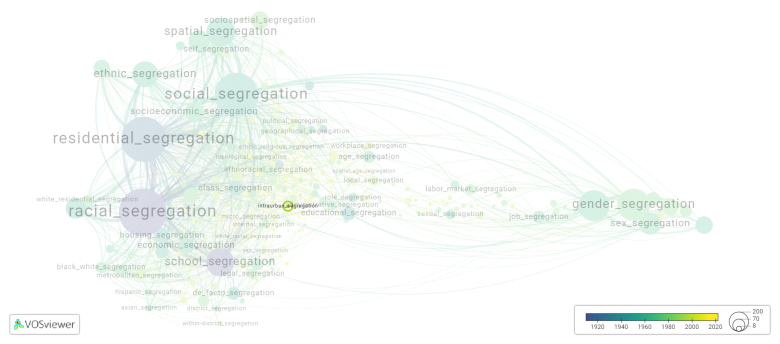Intraurban segregation: Difference between revisions
(Creating page) |
(Creating page) |
||
| (2 intermediate revisions by the same user not shown) | |||
| Line 12: | Line 12: | ||
[[File:intraurban_segregation.png|780x780px]] | [[File:intraurban_segregation.png|780x780px]] | ||
This visualization is based on the study [[Segregation_Wiki:About| The Multidisciplinary Landscape of Segregation Research]]. | |||
For the complete network of | For the complete network of interrelated segregation forms, please refer to: | ||
* [https://tinyurl.com/2235lkhw First year of publication] | |||
* [https://tinyurl.com/2d8wg5n3 Louvain clusters] | |||
* [https://tinyurl.com/223udk5r Betweenness centrality] | |||
* [https://tinyurl.com/244d8unz Disciplines in which segregation forms first emerged (Scopus database).] | |||
==References== | ==References== | ||
==Notes== | ==Notes== | ||
Latest revision as of 07:17, 16 October 2024
Date and country of first publication[1][edit | edit source]
2007
United States
Definition[edit | edit source]
Intra urban segregation is the separation of different social or economic groups within a single city or urban area. This can occur through various means such as housing discrimination, unequal access to resources and services, or zoning policies that restrict certain populations to specific areas. Intra-urban segregation can lead to increased inequality, lack of social cohesion, and limited economic opportunities for disadvantaged communities. Efforts to address intra-urban segregation often involve policies that promote more diverse and inclusive neighborhoods, as well as initiatives to provide equal access to education, healthcare, and other essential resources for all residents.
See also[edit | edit source]
Related segregation forms[edit | edit source]
Intraurban segregation is frequently discussed in the literature with the following segregation forms:
ethnoracial segregation, racial segregation, local segregation

This visualization is based on the study The Multidisciplinary Landscape of Segregation Research.
For the complete network of interrelated segregation forms, please refer to:
References[edit | edit source]
Notes[edit | edit source]
- ↑ Date and country of first publication as informed by the Scopus database (December 2023).
At its current state, this definition has been generated by a Large Language Model (LLM) so far without review by an independent researcher or a member of the curating team of segregation experts that keep the Segregation Wiki online. While we strive for accuracy, we cannot guarantee its reliability, completeness and timeliness. Please use this content with caution and verify information as needed. Also, feel free to improve on the definition as you see fit, including the use of references and other informational resources. We value your input in enhancing the quality and accuracy of the definitions of segregation forms collectively offered in the Segregation Wiki ©.
Intraurban segregation appears in the following literature[edit | edit source]
Chung S.-Y., Brown L.A. (2007). Racial/ethnic residential sorting in spatial context: Testing the explanatory frameworks. Urban Geography, 28(4), 312-339. https://doi.org/10.2747/0272-3638.28.4.312
Lu M., Wan G. (2015). Urbanization and Urban Systems in the People's Republic of China: Research Findings and Policy Recommendations. China's Economy: A Collection of Surveys, 83-98. Wiley Blackwell.https://doi.org/10.1002/9781118982433.ch6
Marcińczak S., Tammaru T., Novák J., Gentile M., Kovács Z., Temelová J., Valatka V., Kährik A., Szabó B. (2015). Patterns of Socioeconomic Segregation in the Capital Cities of Fast Track Reforming Postsocialist Countries. Annals of the Association of American Geographers, 105(1), 183-202. Routledge.https://doi.org/10.1080/00045608.2014.968977
